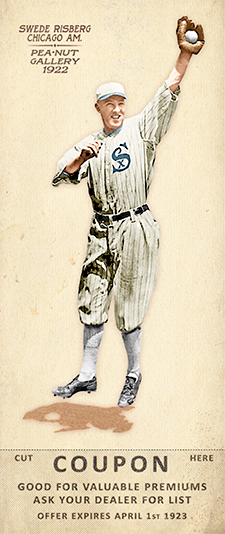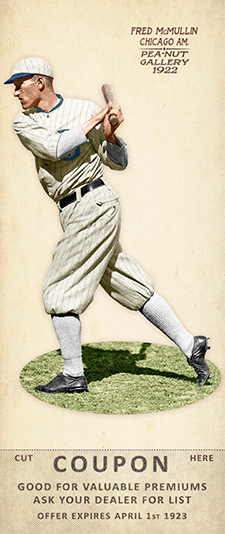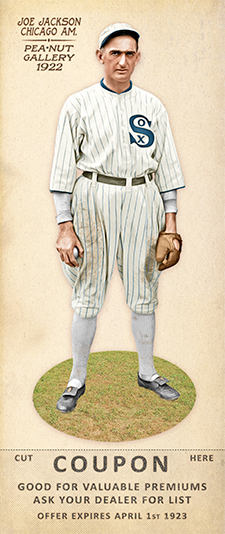
- Series: 1919 Black Sox Scandal
- City: Chicago
- Team: White Sox
- League: American League
Claude Preston Williams (1893-1959) was the third Black Sox player to confess and the first to hear the jury say “Not Guilty,” sparing him from prison but dooming him to a life of shame. Lefty was being groomed to become the White Sox ace and had consistently challenged Cicotte for that unofficial designation throughout the fateful 1919 season. But teammate Chick Gandil’s blandishments lured Williams into the scandal that would forever taint the talented Chicago squad. By the time the Pale Hose finally won another pennant in 1959, Lefty was a month from death. The press noted that he was unable to celebrate, being “tired and aging and ill and sick at heart.” On pace to be an elite southpaw of the 1920s, Lefty Williams instead became a man broken by his betrayal of the game at which he excelled.
Lefty had come up with the Tigers as a kid in 1913, but floundered and was sent to the Pacific Coast League. He starred for the Salt Lake City Bees in ‘15, earning a trip back to the majors when Charles Comiskey purchased his contract. Williams validated the owners’ judgment by helping lead the team to the 1917 pennant with a 17-8 record. The following year was a lost cause for MLB with the war on and the government calling up players. Many, including Williams and his pal Joe Jackson, sought shipyard jobs to escape the draft. This became a wedge within teams and perhaps none more than the Sox. Labeled as “unpatriotic,” the “work or fight” players who chose defense jobs were vilified by management and teammates alike.
Nevertheless, in 1919 Comiskey welcomed his charges back to the fold. Williams was stung by the owner’s stiffing him of his final ‘18 paycheck, adding to an aggrieved mindset. Gandil found an all-too-willing mark when he peddled his scheme to throw the Series that everyone knew the White Sox would be in. Overcoming wildness that plagued his early years, Lefty was terrific that year with a 23-11 record and 2.64 ERA. His remarkable control made his World Series performance all the more notorious. He logged a record three losses and curried trouble every start with a rash of bases on balls. The only other pitcher to lose three games in a Series is George Frazier of the Yankees, who equaled Lefty’s dubious feat in 1981.
- Williams expressed remorse even before the Series ended. Some believe he was threatened by mobsters. Having already received $5,000 mid-Series, he later admitted “I was sorry. I wanted to be out of it and not mixed up in it at all.”

- Series: 1919 Black Sox Scandal
- City: Chicago
- Team: White Sox
- League: American League
George Daniel Weaver (1890-1956) climbed to a lofty height during his baseball career and plummeted to an historic low that would test any man. Buck’s dad insisted he forego his mother’s funeral to begin his pro career in the White Sox system. He ended his career when Judge Landis banished him from the game along with 7 fellow Sox. In between, this gregarious, cheerful soul basked in the shadows of the Great Pyramid sporting a fez during the 1913 world tour and danced for joy after Comiskey’s club locked up the ’17 Series, a team he had led in batting and afield. Although pilloried with his teammates for throwing the 1919 Series, Weaver played errorless ball, hit .324, and was never accused of taking money. He would spend the rest of his life trying to clear his name. After Cicotte and Jackson confessed, the Sporting News headlined: “Chicago Fans Grieve Most for Weaver and Still Hope for Him.”
- Played exclusively for the White Sox (1912-1920), averaging .272, and was the only banned player to remain in Chicago
- Buck successfully sued his penurious owner for his 1921 salary

- Series: 1919 Black Sox Scandal
- City: Chicago
- Team: White Sox
- League: American League
Charles August Risberg (1894-1975) grew up on the streets of San Francisco, dropping out of school in the third grade. He had a flair for baseball and, when he switched to shortstop, he blossomed into a defensive star worthy of a call-up to the White Sox in 1917. Swede’s minor league experience foreshadowed the future outlaw character he would display almost from his arrival in the big leagues. In 1913, when Risberg traveled to the LA area to play in the Pacific Coast League, he was drawn to the Vernon/Venice Tigers. At that time these were the only communities in Los Angeles county that were “wet.” Booze was the defining identifier for owner Pete Maier’s club. When it was in Vernon fans could enter the park directly from Doyle’s bar.
Risberg made the big club based on his defense, but hit so poorly in his rookie season that he only got two pinch hitting appearances in the ‘17 Series when the Sox beat the Giants. Swede returned to California for part of the 1918 season, escaping the draft by taking a shipyard job that amounted mostly to playing semi-pro ball for the company during that “work or fight” year. By his own testimony, Swede was crooked throughout his major league tenure, all with Chicago. He claimed to have been the organizer of a scheme in 1917 to bribe Tiger players to throw some games. And he was at the center of the Black Sox Scandal in 1919. Later many would assert that, despite the clear conspiracy with gamblers, the Reds won fair and square although they were thought to be far inferior to Chicago. It is difficult to make a case from the players’ performance. Risberg would be an exception. He apparently threw himself into the fix with zeal, committing a record eight errors and going 2 for 25 at bat. And his reported payout of $15,000, which was more than four times his salary, was a far bigger reward than others realized. He may have earned his bonus because he served as an enforcer. Joe Jackson received a death threat from Risberg if he “blabbed.” Shoeless Joe would later describe Swede as a “hard guy.”
- True to his scofflaw nature, Risberg defied Judge Landis’ ban and played exhibition ball for years. As the youngest of the “Eight Men Out,” and having a very brief tour in the majors, he had incentive to play wherever he could
- It may be that the game he tarnished got its revenge. Swede had been spiked in Chicago and the wound never properly healed. He lost the leg in his old age, dying in a nursing home in Redding, CA on his 81st birthday

- Series: 1919 Black Sox Scandal
- City: Chicago
- Team: White Sox
- League: American League
Fred Drury McMullin (1891-1952) has been called the “forgotten man” of the Black Sox. Writing for SABR, Jacob Pomrenke called McMullin the "Eighth Man Out, the most obscure of the White Sox players who agreed to throw the 1919 World Series to the Cincinnati Reds."
As a nondescript utility man with little promise to impact the series, Fred would certainly seem to be the unlikeliest member of that talented team to be pursued and paid off by gamblers. Some have suggested that, as the team’s scout, Fred may have contributed to the scheme by providing misleading information to his teammates about Reds hitters and pitchers. Or perhaps, as it is most commonly suggested, McMullin implicated himself in the scandal when he allegedly overheard talk of throwing the Series and insisted on his inclusion in the conspiracy. And yet Ed Cicotte testified that "the idea of the fix had originated in a conversation with Gandil and McMullin." Like so many mysteries that will forever envelope the 1919 Black Sox, the truth of how and why Fred McMullin was involved in the scandal may never be known.
McMullin had come out of West Coast ball where he impressed the Tigers enough to give him an audition at the end of the 1914 season. Fred languished on the bench, watching the likes of Cobb and Crawford before getting his only appearance that year in Fenway, mopping up a Red Sox laugher and striking out in his only at-bat. Returning to California allowed Fred to build his resume and the White Sox signed him for the ‘16 campaign. Again, he joined a stacked team with little chance of breaking into the lineup. In 1917, McMullin got into late-season games and did well; especially helping with his defense in the Series against the Giants, which the Sox won. Fred used his $3,600 bonus to buy a small house.
Following the war-shortened ‘18 season, the White Sox were again a dominant force in 1919. Owners feared the year would be a loss in the war’s aftermath and scheduled another truncated schedule which included smaller player paychecks. In the lead-up to the postseason, Chick Gandil seems to have led the conspiracy that would ensnare Fred and six more teammates.
- McMullin stayed mum the rest of his life concerning the fix
- Unlike his teammates, Fred didn’t try to barnstorm, but he did play some semi-pro ball in LA - until Irish Meusel was fined $100 by the Phillies for playing against him
- McMullin ended his working life in law enforcement, as a court marshal in Los Angeles, and died on the job from a stroke
- Series: 1919 Black Sox Scandal
- City: Chicago
- Team: White Sox
- League: American League
Joseph Jefferson Wofford Jackson (1887-1951) had the “perfectest” swing according to Babe Ruth who copied it. After nearly a century of more contenders, many would still say Shoeless Joe was the purest hitter ever to wield a baseball bat. Expelled from baseball by Judge Landis, Jackson lives in infamy despite demonstrating prowess at the plate and grace afield. While he will ever be branded with the “Black Sox,” Jackson stirred passions that still echo in baseball today.
- Still ranks as the third-highest career batting average in history (.356)
- His .408 average in 1911, his rookie season, is sixth-highest in the modern era




